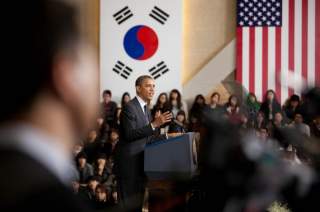Newsflash: The U.S.-South Korea Military Alliance Isn't Working
South Koreans should "understand that the cheap ride is over and the American cavalry won’t be riding to their rescue."
South Korean governments have sought to “pay” the United States by participating in some of Washington’s more foolish wars—Vietnam, Iraq and Afghanistan. However, the small ROK contributions, especially in the latter two conflicts, do not warrant a permanent security guarantee and military deployment amidst the most volatile and dangerous military confrontation on earth.
Trump wants to charge for the U.S. military’s services, but Washington should not put a price on the blood of its people, whether in cash or kind. A better approach would be simply to allow South Koreans to defend themselves. If they don’t want to do so, no worries. But they would understand that the cheap ride is over and the American cavalry won’t be riding to their rescue.
The United States and Korea have plenty of other ties, including commercial and familial connections that span the Pacific. But trade and friendship do not depend on a military relationship.
What to do about the North would remain an issue, but it wouldn’t matter much to the United States. Pyongyang is threatening to attack America not because it cares about America, but because American troops target the DPRK. Washington would continue to favor nonproliferation to be sure, but North Korea’s neighbors, including China, have far more at stake in that issue. And they would have a better opportunity to solve the problem diplomatically without America’s overbearing military presence, which both Beijing and Pyongyang see as threatening. China, in particular, might be willing to be far tougher with Pyongyang if the former didn’t have to worry about ending up with American troops along the Yalu in the event of Korean reunification.
U.S. foreign policy should reflect global realities. When they change, so should Washington’s approach to the world. The radical transformation of Northeast Asia over the last six decades requires a similarly radical transformation of U.S. policy.
Doug Bandow is a Senior Fellow at the Cato Institute and a former Special Assistant to President Ronald Reagan. He is the author of Tripwire: Korea and U.S. Foreign Policy in a Changed World and co-author of The Korean Conundrum: America’s Troubled Relations with North and South Korea.
Image: whitehouse.gov

